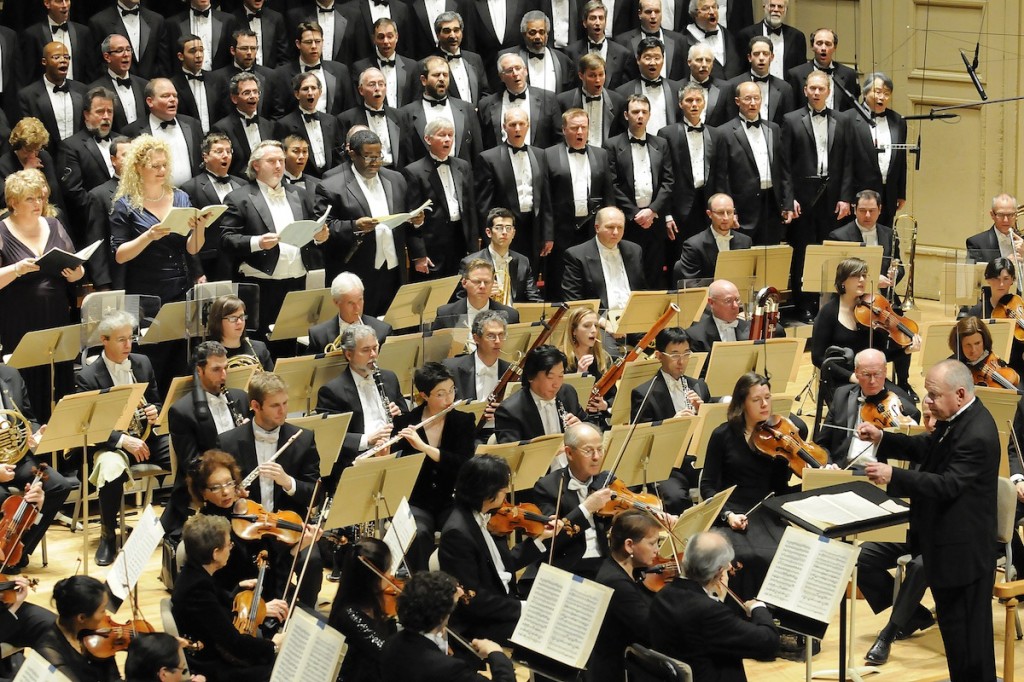With Masur ill, Oliver and BSO struggle in “Missa solemnis”

John Oliver conducts soloists, the BSO and Tanglewood Festival Chorus in Beethoven's "Missa Solemnis" Thursday night. Photo: Stu Rosner
On Thursday night, in circumstances that appeared uncomfortable for all involved, chorus master John Oliver substituted for the indisposed Kurt Masur and led the Boston Symphony Orchestra, Tanglewood Festival Chorus, and vocal soloists in a painfully tentative performance of Beethoven’s Missa solemnis.
Oliver, a revered figure in Boston for decades of superb performances by his Tanglewood ensemble, deserves credit for stepping in with only about a day’s notice, risking embarrassment to save the show.
But having a choral conductor lead a symphony orchestra without preparation is like asking a pianist to give an organ recital. The skills are similar in some ways, and profoundly different in others.
On Thursday night Oliver elected, probably wisely, not to try to indicate much in the way of expression, but to plant his feet on the podium and keep time. Even this modest goal was not met, however, as the orchestra had difficulty following his beat and struggled to keep together all evening.
Even the chorus, although doubtless well prepared for their expected performances with Masur, seemed often to be on autopilot, as if distracted by concern for their boss.
The four soloists, however, were in splendid voice, and mostly well-matched in style and timbre–although tenor Simon O’Neill sounded more tightly-wound than the other three, and he let in a few sliding attacks better suited to the opera house.
Soprano Christine Brewer sang with easy power and a fine rounded tone in the early going, but later showed signs of strain, whether from the demands of her part or the evening’s difficulties in general. Mezzo-soprano Michelle DeYoung’s big, round voice remained satisfyingly firm throughout. Bass-baritone Eric Owens easily held his own in the group, delivering admirably clear, well-projected tone through his whole range.
In the early movements of Beethoven’s work—the Kyrie and especially the extroverted Gloria—the abundance of noise and activity can mask a multitude of problems. The sparse and visionary later movements, however, call for spiritual imagination and interpretive risk-taking that is far beyond anything that could have been achieved in this performance. One wonders why one of the orchestra’s assistant conductors wasn’t on standby to be available for these concerts.
Even considering the unfortunate circumstances Thursday night, this Missa solemnis proved something of an embarrassment to a fine orchestra. If the two additional performances proceed as scheduled on Friday and Saturday, one can only hope that Oliver and the musicians will find a comfort zone in which they can make music together.
The program will be repeated 7 p.m. Friday and 8 p.m. Saturday. bso.org; 617-266-1492.
Posted in Performances
Posted Feb 24, 2012 at 3:21 pm by Bill
Thank you for an honest and balanced review. I found the performance utterly painful. And, frankly, the last 5 or 6 performances I have seen with the Tanglewood Chorus have been rather poor: shrill, screeching, and lacking nuance, especially with the sopranos who lose it entirely above G.
After reading The Globe’s ridiculously positive review, I thought I must have been at a different concert!
Posted Feb 24, 2012 at 11:48 pm by MK
I just saw the performance from Friday night and it seems like they must have put a ton of work in earlier this afternoon because the Missa sounded much better than this review from Thursday night. The were a couple of hiccups in the orchestra but the chorus was very solid, especially considering how difficult of a piece it is, one of the hardest in the choral repertoire. My only two issues with the choir were that they could have used a bit of work with diction, it was good not great, and I thought their dynamics were a bit off. Rarely were the piano parts actually piano. Most were more in the range of mezzo-piano on the verge of mezzo-forte.
I agree with the article that it seemed much like Oliver was just beating time from the podium. There did not seems to be much interaction with the orchestra especially. But, conducting the full piece with basically no notice it was a very good performance on Friday night.
Posted Feb 25, 2012 at 11:09 pm by Frank Graves
The Saturday performance also suffered from highly reserved, time-keeping conducting and the result was a rather shallow emotional range to even the most poignant movements. Oliver’s choral conducting was not well synchronized with the beat, especially in the slow movements, due in part to the tradition in choral conducting of using very circular beats more likely to signal the beat at the top of the stroke/circle (at various erratic heights) rather than at the bottoom. Malcolm Lowe played a lovely solo in the Sanctus, and the choral diction and precision was excellent, but overall the performnce did not have much magic.